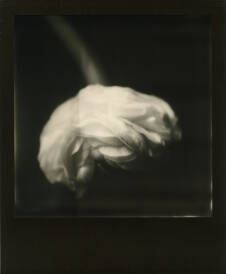I, Oblomov (signed)
by Ikuru Kuwajima
Photographs: Ikuru Kuwajima
Publisher: Photobookfest Moscow
144 pages
Pictures: 53
Year: 2017
ISBN: 9785905196041
Comments: 210 mm x 180 mm (with a special pillow-like book jacket: 240 mm x195 mm), editions of 500, languages: English, Russian
I, Oblomov is an ode to the novel Oblomov, written in the mid-19th century by the Russian writer Ivan Goncharov. More than 150 years later, it still remains a key to deciphering the Russian mentality, which for centuries has both perplexed and captivated foreign travelers in the region. The novel’s hero, Ilya Ilyich Oblomov, is a wealthy landowner living in St. Petersburg. He is a humane and gentle man, but above all he is passive in the extreme. Day after day, he lies on the couch, absent-mindedly receiving a stream of visitors. Lost in aimless reveries, he seems incapable of even the simplest actions; horrified at the prospect of work, he also seems to have no appetite for life beyond his sluggish routine. Whether this is pure laziness, or a stoic wisdom, Oblomov’s strange lethargy – or “Oblomovshchina” (Oblomovism) – continues to be a powerful force in Russia today. In this project, I offer my own interpretation of this distinctly Russian phenomenon through a series of self-portraits and interior photographs taken over the course of my travels in Russia, Ukraine, Kazakhstan and Kyrgyzstan. As the images show, I often found myself lying down for long periods, overcome by depression, laziness, bad weather or hangover – evidence that after nine years of living in the former USSR, Oblomovshchina can also become the reality of a Japanese photographer. “Russia cannot be understood with the mind alone...” (F. Tyutchev, 1866); perhaps no other quote captures the significance of Oblomov so well. Over time, Russia seeps into the body; even if it cannot be explained, it is powerfully felt. If a number of famous Russians, such as Tolstoy, Dostoevsky and Chekhov, admired Oblomov, others reacted against it. Lenin, for instance, wrote that “the old Oblomov has remained [with us], and we must wash him, cleanse him, shake him and thrash him, in order to get some sense [out of him].” Nabokov, for his part, once commented: “Two Ilyiches ruined Russia” – Ilya Ilyich Oblomov and Vladimir Ilyich Lenin. Not even Lenin, however, was able to loosen Oblomovshchina’s grip on Russian society. Living here, I joined the ranks of countless modern Oblomovs, sleeping away the crises, living in our dreams.
Ikuru Kuwajima
Moscow, March 2017
More books by Ikuru Kuwajima
-
Tundra Kids (signed)
by Ikuru Kuwajima
Euro 35 -
Tundra Kids (book + 2 prints)
by Ikuru Kuwajima
Euro 100 -
Tundra Kids
by Ikuru Kuwajima
Euro 29 -
Volga After Volga (signed)
by Ikuru Kuwajima
Euro 35 -
Trail (signed)
by Ikuru Kuwajima
Euro 42
more books tagged »Russian« | >> see all
-
Rock (last copy)
by Roman Korovin
Euro 32 -
The Bolshoi
by Sasha Gusov
sold out -
The City of Brides (signed - last copy)
by Alena Zhandarova
Euro 250 -
Planet Lovigin (last copy)
by Petr Lovigin
Euro 39.90 -
If You Have a Secret (signed)
by Irina Popova
Euro 165 -
Tiksi (signed)
by Evgenia Arbugaeva
sold out
more books tagged »handmade« | >> see all
-
Shipwrecked (signed)
by Ekaterina Vasilyeva
Euro 62 -
DOM - Document Object Model (signed - last copy)
by Julia Borissova
sold out -
Sentieri (signed)
by Andrea Boscardin
Euro 165 -
Makers of East London
by Charlotte Schreiber & Katie Treggiden
sold out -
Makers of East London - used copy
by Charlotte Schreiber & Katie Treggiden
Euro 39 23.40 -
Tell the children (signed)
by Andrea Geremia
sold out
more books tagged »sleep« | >> see all
more books tagged »literature« | >> see all
Random selection from the Virtual bookshelf josefchladek.com
I, Oblomov (signed)
by Ikuru Kuwajima
Photographs: Ikuru Kuwajima
Publisher: Photobookfest Moscow
144 pages
Pictures: 53
Year: 2017
ISBN: 9785905196041
Comments: 210 mm x 180 mm (with a special pillow-like book jacket: 240 mm x195 mm), editions of 500, languages: English, Russian
I, Oblomov is an ode to the novel Oblomov, written in the mid-19th century by the Russian writer Ivan Goncharov. More than 150 years later, it still remains a key to deciphering the Russian mentality, which for centuries has both perplexed and captivated foreign travelers in the region. The novel’s hero, Ilya Ilyich Oblomov, is a wealthy landowner living in St. Petersburg. He is a humane and gentle man, but above all he is passive in the extreme. Day after day, he lies on the couch, absent-mindedly receiving a stream of visitors. Lost in aimless reveries, he seems incapable of even the simplest actions; horrified at the prospect of work, he also seems to have no appetite for life beyond his sluggish routine. Whether this is pure laziness, or a stoic wisdom, Oblomov’s strange lethargy – or “Oblomovshchina” (Oblomovism) – continues to be a powerful force in Russia today. In this project, I offer my own interpretation of this distinctly Russian phenomenon through a series of self-portraits and interior photographs taken over the course of my travels in Russia, Ukraine, Kazakhstan and Kyrgyzstan. As the images show, I often found myself lying down for long periods, overcome by depression, laziness, bad weather or hangover – evidence that after nine years of living in the former USSR, Oblomovshchina can also become the reality of a Japanese photographer. “Russia cannot be understood with the mind alone...” (F. Tyutchev, 1866); perhaps no other quote captures the significance of Oblomov so well. Over time, Russia seeps into the body; even if it cannot be explained, it is powerfully felt. If a number of famous Russians, such as Tolstoy, Dostoevsky and Chekhov, admired Oblomov, others reacted against it. Lenin, for instance, wrote that “the old Oblomov has remained [with us], and we must wash him, cleanse him, shake him and thrash him, in order to get some sense [out of him].” Nabokov, for his part, once commented: “Two Ilyiches ruined Russia” – Ilya Ilyich Oblomov and Vladimir Ilyich Lenin. Not even Lenin, however, was able to loosen Oblomovshchina’s grip on Russian society. Living here, I joined the ranks of countless modern Oblomovs, sleeping away the crises, living in our dreams.
Ikuru Kuwajima
Moscow, March 2017
More books by Ikuru Kuwajima
-
Tundra Kids (signed)
by Ikuru Kuwajima
Euro 35 -
Tundra Kids (book + 2 prints)
by Ikuru Kuwajima
Euro 100 -
Tundra Kids
by Ikuru Kuwajima
Euro 29 -
Volga After Volga (signed)
by Ikuru Kuwajima
Euro 35 -
Trail (signed)
by Ikuru Kuwajima
Euro 42
more books tagged »Russian« | >> see all
-
Rock (last copy)
by Roman Korovin
Euro 32 -
The Bolshoi
by Sasha Gusov
sold out -
The City of Brides (signed - last copy)
by Alena Zhandarova
Euro 250 -
Planet Lovigin (last copy)
by Petr Lovigin
Euro 39.90 -
If You Have a Secret (signed)
by Irina Popova
Euro 165 -
Tiksi (signed)
by Evgenia Arbugaeva
sold out
more books tagged »handmade« | >> see all
-
Shipwrecked (signed)
by Ekaterina Vasilyeva
Euro 62 -
DOM - Document Object Model (signed - last copy)
by Julia Borissova
sold out -
Sentieri (signed)
by Andrea Boscardin
Euro 165 -
Makers of East London
by Charlotte Schreiber & Katie Treggiden
sold out -
Makers of East London - used copy
by Charlotte Schreiber & Katie Treggiden
Euro 39 23.40 -
Tell the children (signed)
by Andrea Geremia
sold out
more books tagged »sleep« | >> see all
more books tagged »literature« | >> see all
Random selection from the Virtual bookshelf josefchladek.com
I, Oblomov (signed)
by Ikuru Kuwajima
Photographs: Ikuru Kuwajima
Publisher: Photobookfest Moscow
144 pages
Pictures: 53
Year: 2017
ISBN: 9785905196041
Comments: 210 mm x 180 mm (with a special pillow-like book jacket: 240 mm x195 mm), editions of 500, languages: English, Russian
I, Oblomov is an ode to the novel Oblomov, written in the mid-19th century by the Russian writer Ivan Goncharov. More than 150 years later, it still remains a key to deciphering the Russian mentality, which for centuries has both perplexed and captivated foreign travelers in the region. The novel’s hero, Ilya Ilyich Oblomov, is a wealthy landowner living in St. Petersburg. He is a humane and gentle man, but above all he is passive in the extreme. Day after day, he lies on the couch, absent-mindedly receiving a stream of visitors. Lost in aimless reveries, he seems incapable of even the simplest actions; horrified at the prospect of work, he also seems to have no appetite for life beyond his sluggish routine. Whether this is pure laziness, or a stoic wisdom, Oblomov’s strange lethargy – or “Oblomovshchina” (Oblomovism) – continues to be a powerful force in Russia today. In this project, I offer my own interpretation of this distinctly Russian phenomenon through a series of self-portraits and interior photographs taken over the course of my travels in Russia, Ukraine, Kazakhstan and Kyrgyzstan. As the images show, I often found myself lying down for long periods, overcome by depression, laziness, bad weather or hangover – evidence that after nine years of living in the former USSR, Oblomovshchina can also become the reality of a Japanese photographer. “Russia cannot be understood with the mind alone...” (F. Tyutchev, 1866); perhaps no other quote captures the significance of Oblomov so well. Over time, Russia seeps into the body; even if it cannot be explained, it is powerfully felt. If a number of famous Russians, such as Tolstoy, Dostoevsky and Chekhov, admired Oblomov, others reacted against it. Lenin, for instance, wrote that “the old Oblomov has remained [with us], and we must wash him, cleanse him, shake him and thrash him, in order to get some sense [out of him].” Nabokov, for his part, once commented: “Two Ilyiches ruined Russia” – Ilya Ilyich Oblomov and Vladimir Ilyich Lenin. Not even Lenin, however, was able to loosen Oblomovshchina’s grip on Russian society. Living here, I joined the ranks of countless modern Oblomovs, sleeping away the crises, living in our dreams.
Ikuru Kuwajima
Moscow, March 2017
More books by Ikuru Kuwajima
-
Tundra Kids (signed)
by Ikuru Kuwajima
Euro 35 -
Tundra Kids (book + 2 prints)
by Ikuru Kuwajima
Euro 100 -
Tundra Kids
by Ikuru Kuwajima
Euro 29 -
Volga After Volga (signed)
by Ikuru Kuwajima
Euro 35 -
Trail (signed)
by Ikuru Kuwajima
Euro 42
more books tagged »Russian« | >> see all
-
Rock (last copy)
by Roman Korovin
Euro 32 -
The Bolshoi
by Sasha Gusov
sold out -
The City of Brides (signed - last copy)
by Alena Zhandarova
Euro 250 -
Planet Lovigin (last copy)
by Petr Lovigin
Euro 39.90 -
If You Have a Secret (signed)
by Irina Popova
Euro 165 -
Tiksi (signed)
by Evgenia Arbugaeva
sold out
more books tagged »handmade« | >> see all
-
Shipwrecked (signed)
by Ekaterina Vasilyeva
Euro 62 -
DOM - Document Object Model (signed - last copy)
by Julia Borissova
sold out -
Sentieri (signed)
by Andrea Boscardin
Euro 165 -
Makers of East London
by Charlotte Schreiber & Katie Treggiden
sold out -
Makers of East London - used copy
by Charlotte Schreiber & Katie Treggiden
Euro 39 23.40 -
Tell the children (signed)
by Andrea Geremia
sold out
more books tagged »sleep« | >> see all
more books tagged »literature« | >> see all
Random selection from the Virtual bookshelf josefchladek.com








































_;jpg?c=58f5aa6590b56fe92ea841bf2f0025fa)


;jpg?c=349a0a84e14e7c243c4ca22af0dac1bd)
